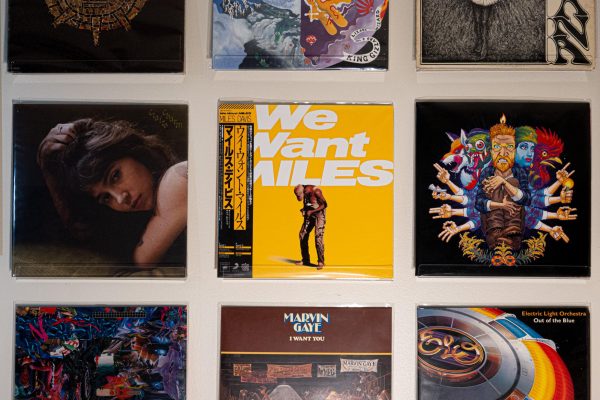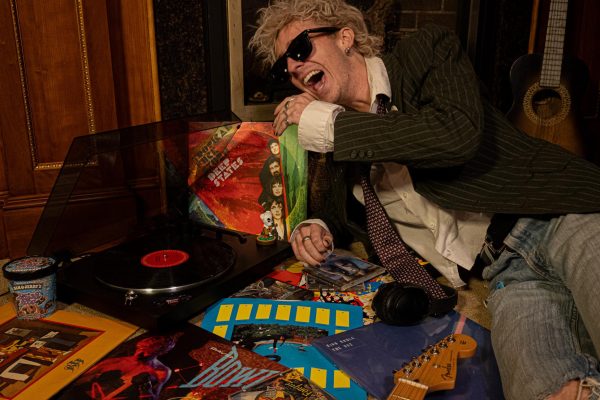I always felt the whole “it sounds better on vinyl” notion was bullshit. Why would I stop my day to listen to your music when I can just put it on my phone, in its mixed and mastered glory?
One day, I picked up a busted-up pressing from the 1970s of Emerson, Lake and Palmer’s “Brain Salad Surgery.” When I listened to it, I got it. It didn’t sound better, but that was never the point—I heard each cog in the machine, I heard Emerson ripping it on the Moog, Lake’s clever lyrics, and Palmer’s spacey drums—but not as “ELP,” but three men recording their greatest record in London’s Olympic and Advision Studios.
Now I buy all sorts of vinyl and CDs just to try to take albums I’ve listened to death, and have them reinvented in my head. Where that journey has led me is about $500 in the hole and a respectable collection of 100 LPs spanning a busted-up “Focus 3” to a newly unboxed “To Pimp a Butterfly.”
That being said, I’m a music journalist who’s collected too many Skylanders growing up, so my reasons for buying physical media err on the side of “collector” (hoarder), but it’s fair to say that having a collection of albums you like in your hands is special. Every morning I wake up in my room and I see Miles Davis and Clairo on my wall, which gets me ready to tackle the day.

While I love seeing Tyler Childer’s tweaked-out face on “Country Squire” every day of the semester, my love for vinyl does not get credit for my music taste. That goes to friends, family, and my lover—my Spotify account.
This is the reality of discovering music in 2024—almost all major releases can be located on streaming services of any kind; I’m talking about the ability to organize your saved albums in multiple fashions and order your favorite songs in the form of this month’s cutesy title accompanied by your best Pinterest board image (normal people call this a playlist).
But arguably, the best part of these streaming services is not the aesthetic your account holds, but the accessibility to new music. With your monthly payment, you can send whoever you want a song you’ve been enjoying and they can hear it at the click of a button.
It sounds cliched, but we take modern luxury for granted. Tim Riley, music journalist and professor at Emerson College, recounts his experience with FM Radio growing up listening to new music.
“You would tune in on a Wednesday afternoon at 3 p.m. because that was when your DJ was there and [they] would play what you like—you liked their vibe,” Riley says. “They put tracks together in a way that you really enjoy, you would pay attention to certain DJs on these FM stations and that’s how you would find stuff out and you’d learn about stuff … the DJs had knowledge.”
Riley says modern DJs don’t cut it, and that DJs used to be knowledgeable about their craft.
“DJs used to have intelligence and they were able to express themselves creatively with how they put sets together,” Riley says.
Flipping through the radio today, you’ll find the most listened-to stations end up being news-based or sports-based; as for music-based radio stations however, it seems Riley’s point is on the money—as more people are shifting to streaming.
On top of convenience, streaming has its own system of helping listeners discover new music. Spotify’s “Discover Weekly” or Apple Music’s “Personalized Radio” attempt to fill the shoes of the DJs Riley speaks about. These services use their wide musical database to assume what you’d like to hear based on your existing taste.
“Now I have found [streaming services], but I’m not as impressed by that algorithm as I think I should be,” Riley says. “So for a die-hard, somebody who’s really into music, a lot of those things don’t impress me and I think they probably should impress me more.”
Dylan Jack, a percussionist, improviser, composer, and educator at Emerson College, who also performs in his creative outlet the Dylan Jack Quartet, also thinks that the algorithm is a lackluster companion.
“[I go onto] Spotify, it says, you may like this band, I listened to a song [and it] sounds nothing like the band I like,” Jack says. “But if I talk to somebody at a record store or a friend who knows a lot about music, they’ll say, ‘Hey, check out this band.’”
Jack’s opinion highlights the main difference between the human element of discovering music versus the algorithm feeding you content.
“I think talking with individuals, you get more passion about a specific band,” Jack says.
With our new streaming service overlords, we have seen a decline in DJs guiding us to new music. Jack’s approach sounds more appealing; human interaction with fellow music lovers unsurprisingly leads us to a plethora of great tracks. If your friends are uncultured and losers though, look no further than the musical library where CDs and vinyls are sold: the record store.
In Brookline, Mass., Village Vinyl & Hi-Fi sits on Harvard Street in the busy, legendary Coolidge Corner area.
Inside displays tight aisles bustling with people flipping through thousands of records. Younger shoppers gasp at finding alternative covers to their favorite projects as older folks chat with employees, searching for sought-after musical grails.
Jonathan Sandler, the store owner, quickly assesses the long line of customers while conducting friendly banter with each of them, commenting on their choice in pins to one young woman’s selection of “When the Pawn…” by Fiona Apple.
Sandler and his employee Jake Moody discuss their musical origins as they deal with the rush.
“My first [piece of physical media] was a CD of The Beatles, ‘White Album,’ as a kid,” Moody says. “I listened to it until it was so scratched that it didn’t work anymore. It definitely got its use.”
Despite the environment, the excitement of sharing their love for music is genuine and present in their voices.
“When I was in fourth grade, my aunt from Minnesota mailed me ‘Freedom of Choice’ by DEVO,” Sandler says.
While music lovers don’t have time to list all of their favorite projects and songs, their knowledge of the temple they work in proves their oracle status.
The one moment Sandler is able to break away from the chaos, he makes it very clear that starting up a record store is not a simple task—or a cheap one.
“It’s a ton of work, [and] a lot of fun, but you need money. You can’t start with nothing to do this. You need to have backing,” Sandler says. “Kids are thinking of starting a record store with five grand in their account—good luck.”
While the average person can’t build their own Village Vinyl & Hi-Fi sanctuary, they can still do the greatest music fan homage of buying a vinyl or CD.
If you’re not convinced yet, the perspective of those who found religion for an undying love for music might sway you into emptying your bank account.
“I think owning a CD or owning some kind of physical product is important, it was kind of an event,” Jack says. “When you open the package, aside from looking at the actual image and then seeing the cover, and then you open it up, and then there’s this booklet, you open the booklet, and then you sometimes see the people for the very first time.”
Jack highlighted the child-like discovery of figuring out what each band member played.
“Oh, wow, that’s the guitarist? Who is the guitarist? Who is that person?” Jack says.
Music education major and a composition minor at Berklee College of Music, Anna Huynh, feels physical media is more simple than a discovery.
“People just really like to have physical objects, I feel like a lot of people also use it for the nostalgia of having a vinyl or CD,” Huynh says. “A lot of people I know, they don’t really listen to vinyls or CDs, they just have it just because of the vibes.”
Sandler finds listening to vinyl to be more intimate.
“I find that streaming just makes everything seem so homogenous. I like things to stand out from one another, I like physical media, I grew up with it,” Sandler said. “It’s stuff like the liner notes and just the tactile experience. I don’t sit down and actively put on Spotify and really get into the zone, but if I’m putting on a record at home, I do—It’s a special physical thing.”
Regardless of your stance, next time you find yourself with some extra coin—buy a record you love on vinyl and take the time to ingrain yourself in the musical dogma of the singers you replicate in the shower. Look at the lyrics of songs as the needle guides you, search for the random name you’ll forget the next day who happens to play the flute on track 6, and showcase your new work of art beside your nightstand so the world knows of your uncompromising love.
